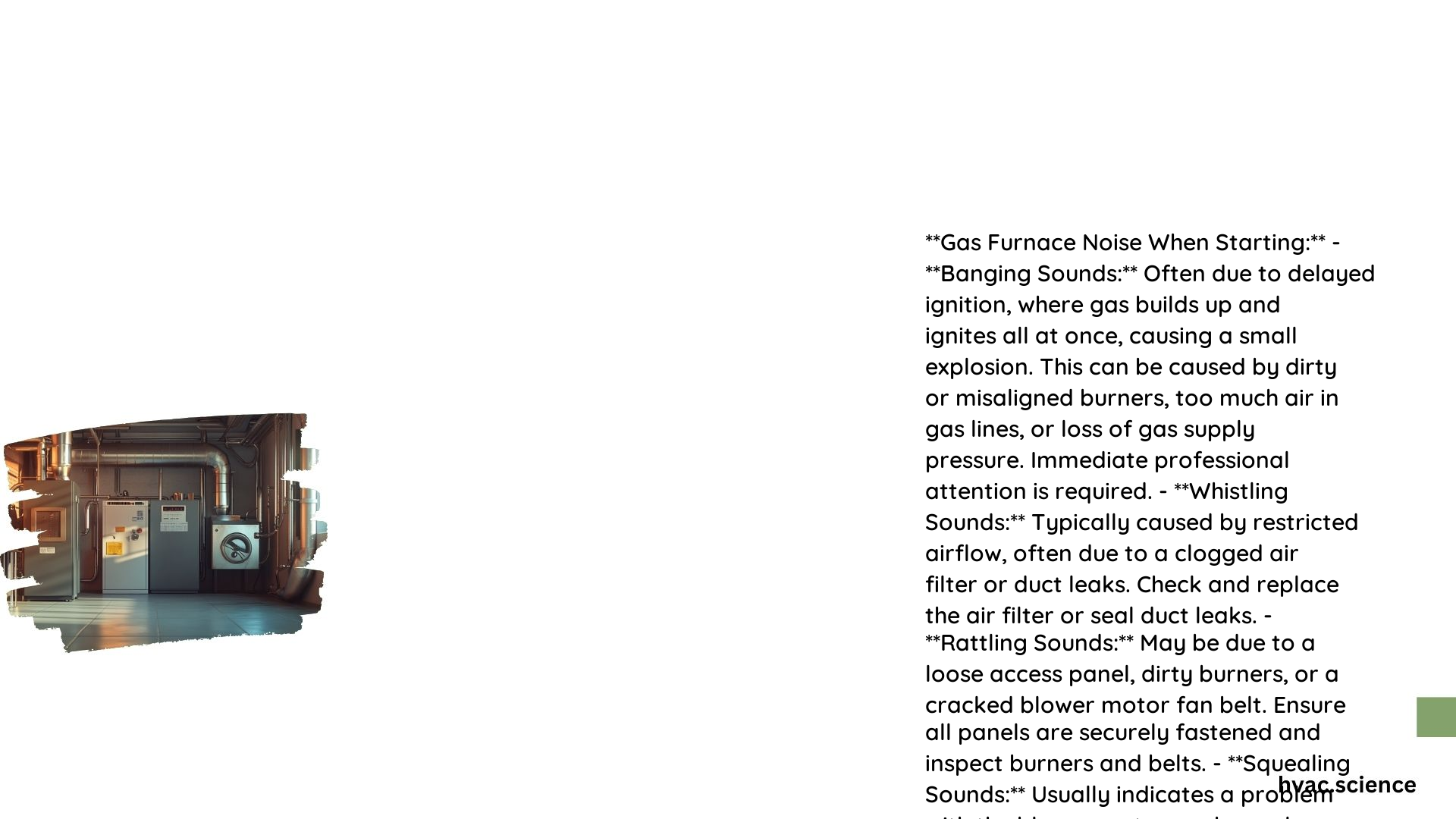Comprehensive Guide for Gas Furnace Noise When Starting
A loud banging or booming noise during the startup of a gas furnace is often caused by delayed gas ignition, which can be due to a clogged air filter, dirty burners, or problems with the ignition system. This article will provide a detailed guide on the causes, technical explanations, and step-by-step troubleshooting for gas furnace noise when starting.
What Causes Loud Banging Sound During Startup?
Delayed Ignition:
One of the primary causes of a loud banging or booming noise during the startup of a gas furnace is delayed gas ignition. This occurs when the gas-to-air ratio is poor, leading to a buildup of gas in the combustion chamber. When the gas finally ignites, it causes a small explosion, resulting in the banging noise. This issue can be due to a clog, dirty burners, or problems with the ignition system.
Dirty Air Filter:
While a dirty air filter is more commonly associated with whistling or reduced airflow, it can indirectly contribute to other issues that might lead to banging noises. For instance, a clogged filter can cause the furnace to work harder, potentially exacerbating existing problems like delayed ignition.
What are the Technical Explanations for Loud Noises on Startup?
Prepurge Cycle:
When a gas furnace starts up, it often makes a noise due to the draft induction fan, also known as the prepurge cycle. This fan clears any potential gas buildup in the combustion chamber before the burners ignite. This noise is normal but can be louder if there are issues with the fan or other components.
Mechanical Issues:
Loud noises can also be caused by mechanical problems such as a loose belt in the blower motor, unbalanced blower wheels, or worn-out bearings. These issues can produce a variety of sounds including squealing, grinding, and thumping.
How to Fix a Gas Furnace Making Loud Noises on Startup?
Step-by-Step Troubleshooting:
- Check the Air Filter:
-
Ensure the air filter is clean and not clogged. Replace it if necessary to improve airflow and reduce strain on the furnace.
-
Inspect the Burners:
-
Clean or replace dirty gas burners to ensure proper ignition and prevent gas buildup.
-
Check for Loose Parts:
-
Verify that all bolts and fittings are secure. Loose parts can cause rattling or banging noises.
-
Blower Motor and Fan:
-
If the noise is related to the blower motor, check for worn-out bearings or a loose belt. Lubricate or replace these components as needed.
-
Draft Induction Fan:
- If the noise is from the draft induction fan, ensure it is functioning correctly. A failing motor may need to be replaced.
Necessary Tools and Measurements:
- Multimeter: To check electrical components like capacitors or transformers.
- Lubricant: For lubricating bearings.
- Replacement Parts: Such as belts, bearings, or the draft induction fan motor.
- Safety Equipment: Gloves, safety glasses, and a gas detector for safety when working with gas systems.
What Causes Popping Noises on Startup?
Popping Noises:
Popping noises during startup can be caused by several factors:
- Expansion and Contraction of Ducts:
-
When warm air hits cold metal ducts, it causes expansion and contraction, leading to popping sounds.
-
Dirty Gas Burners:
-
Contaminated gas burners can cause gas to accumulate and lead to popping noises as the gas ignites.
-
Delayed Gas Ignition:
- Similar to banging noises, delayed ignition can also cause popping sounds due to the buildup and sudden ignition of gas.
How to Address Popping Noises?
Detailed Solutions:
- Clean the Gas Burners:
-
Regularly clean the gas burners to prevent sediment buildup and ensure proper gas ignition.
-
Check and Clean the Ducts:
-
Ensure the air ducts are clear of debris and not undersized for the furnace. This can help reduce the noise caused by expansion and contraction.
-
Adjust or Replace the Burners:
- If the burners are dirty or malfunctioning, adjust or replace them to prevent gas accumulation and popping noises.
Required Materials or Products:
- Cleaning Tools: For cleaning the gas burners and ducts.
- Replacement Burners: If the existing burners are damaged or beyond cleaning.
- Duct Insulation: To reduce the noise from duct expansion and contraction.
When Should You Seek Professional Help?
Indicators of Severity:
- Frequency and Volume of Noises: If the noises are persistent, loud, or worsening over time.
- Type of Noise: Banging, booming, or popping noises are more serious than humming or squealing.
- Safety Risks: Any indication of gas leaks, carbon monoxide buildup, or other safety hazards.
Potential Costs Associated with Professional Intervention:
- Diagnostic Fees: Typically range from $50 to $200.
- Repair Costs: Can vary widely depending on the issue, but common repairs like replacing a blower motor or draft induction fan can cost between $200 to $1,000.
- Replacement Costs: If the furnace needs to be replaced due to severe damage, costs can range from $1,000 to $5,000 or more, depending on the model and installation.
Reference Links
- Furnace Noises? What’s Normal & What’s Not by Estes Services: [https://www.estesservices.com/blog/furnace-noises-whats-normal-whats-not/]
- Gas furnace start up noise on Reddit: [https://www.reddit.com/r/HVAC/comments/9yvnxr/gas_furnace_start_up_noise/]
- Furnace Noises (And What They Might Mean) by Swan Heating and Air: [https://swanheatingandair.com/furnace-noises-and-what-they-might-mean/]

